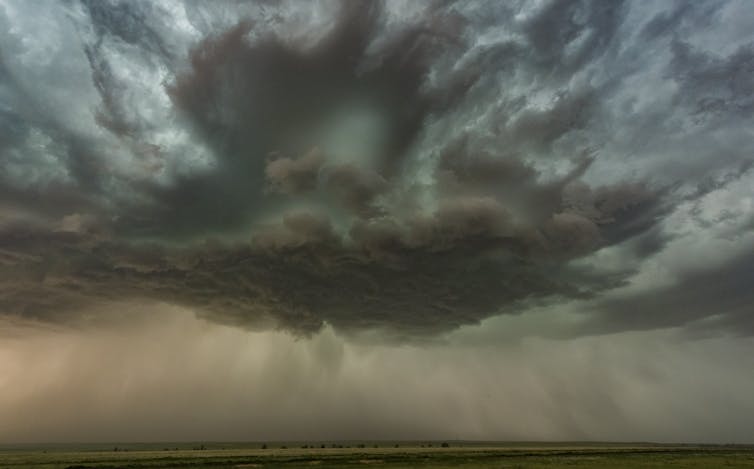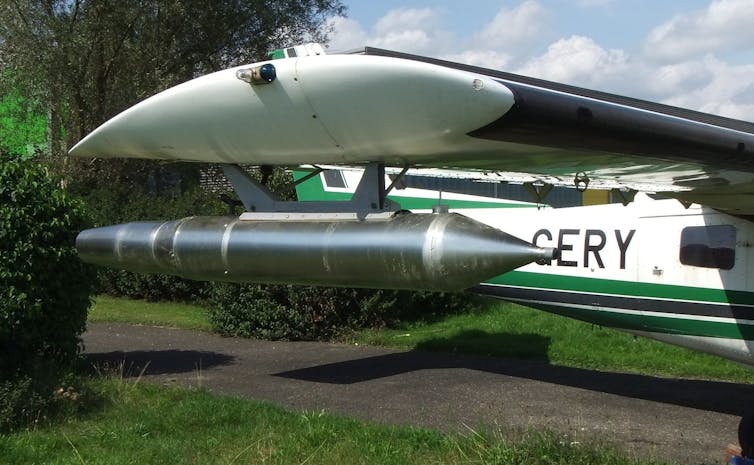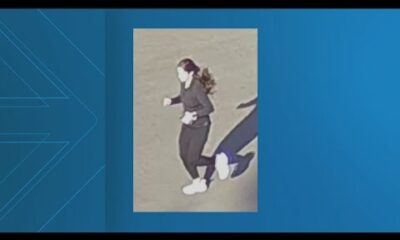Podcasts
Cloud seeding can increase rain and snow, and new techniques may make it a lot more effective – podcast
Cloud seeding can increase rain and snow, and new techniques may make it a lot more effective – podcast

John Finney Photography/Moment via Getty Images
Daniel Merino, The Conversation and Nehal El-Hadi, The Conversation
When an unexpected rainstorm leaves you soaking wet, it is an annoyance. When a drought leads to fires, crop failures and water shortages, the significance of weather becomes vitally important.
If you could control the weather, would you?
Small amounts of rain can mean the difference between struggle and success. For nearly 80 years, an approach called cloud seeding has, in theory, given people the ability to get more rain and snow from storms and make hailstorms less severe. But only recently have scientists been able to peer into clouds and begin to understand how effective cloud seeding really is.
In this episode of “The Conversation Weekly,” we speak with three researchers about the simple yet murky science of cloud seeding, the economic effects it can have on agriculture, and research that may allow governments to use cloud seeding in more places.
Katja Friedrich, a professor of atmospheric and oceanic sciences at the University of Colorado, Boulder in the U.S., is a leading researcher on cloud seeding. “When we do cloud seeding, we are looking for clouds that have tiny super-cooled liquid droplets,” she explains. Silver iodide is very similar in structure to an ice crystal. When the droplets touch a particle of silver iodide, “they freeze, then they can start merging with other ice crystals, become snowflakes and fall out of the cloud.”
While the process is fairly straightforward, measuring how effective it is in the real world is not, according to Friedrich. “The problem is that once we modify a cloud, it’s really difficult to say what would’ve happened if you hadn’t cloud-seeded.” It’s hard enough to predict weather without messing with it artificially.

Zuckerle/Wikimedia Commons, CC BY-SA
In 2017, Friedrich’s research group had a breakthrough in measuring the effect of cloud seeding. “We flew some aircraft, released silver iodide and generated these clouds that were like these six exact lines that were downstream of where the aircraft were seeding,” she says. They then had a second aircraft fly through the clouds. “We could actually quantify how much snow we could produce by two hours of cloud seeding.” That effect, according to research on cloud seeding, is an increase in precipitation of somewhere around 5% to 20% or 30%, depending on conditions.
Measuring the effect on precipitation – whether rain or snow – directly may have taken complex science and a bit of luck, but in places that have been using cloud seeding for long periods of time, the economic benefits are shockingly clear.
Dean Bangsund is a researcher at North Dakota State University who studies the economics of agriculture. “We have a high amount of hail damage in North Dakota,” said Bangsund. For decades, the state government has been using cloud seeding to reduce hail damage, as cloud seeding leads to the formation of more pieces of smaller hail compared to fewer pieces of larger hail. “It doesn’t 100% eliminate hail; it’s designed to soften the impact.”
Every 10 years, the state of North Dakota does an analysis on the economic impacts of the cloud seeding program, measuring both reduction in hail damage and benefits from increased rain. Bangsund led the last report and says that for every dollar spent on the cloud seeding program, “we are looking at something that is anywhere from $8 or $9 in benefit on the really lowest scale, up to probably $20 of impact per acre.” With millions of acres of agricultural fields in the cloud seeding area, that is a massive economic benefit.
Both Freidrich and Bangsund emphasized that cloud seeding, while effective in some cases, cannot be used everywhere. There is also a lot of uncertainty in how much of an effect it has. One way to improve the effectiveness and applicability of cloud seeding is by improving the seed. Linda Zou is a professor of civil infrastructure and environmental engineering at Khalifa University in the United Arab Emirates.
Her work has focused on developing a replacement for silver iodide, and her lab has developed what she calls a nanopowder. “I start with table salt, which is sodium chloride,” says Zou. “This desirable-sized crystal is then coated with a thin nanomaterial layer of titanium dioxide.” When salt gets wet, it melts and forms a droplet that can efficiently merge with other droplets and fall from a cloud. Titanium dioxide attracts water. Put the two together and you get a very effective cloud-seeding material.
From indoor experiments, Zou found that “with the nanopowders, there are 2.9 times the formation of larger-size water droplets.” These nanopowders can also form ice crystals at warmer temperatures and less humidity than silver iodide.
As Zou says, “if the material you are releasing is more reactive and can work in a much wider range of conditions, that means no matter when you decide to use it, the chance of success will be greater.”
This episode was written and produced by Katie Flood. Mend Mariwany is the executive producer of The Conversation Weekly. Eloise Stevens does our sound design, and our theme music is by Neeta Sarl.
You can find us on Twitter @TC_Audio, on Instagram at theconversationdotcom or via email. You can also subscribe to The Conversation’s free daily email here.
Listen to “The Conversation Weekly” via any of the apps listed above, download it directly via our RSS feed or find out how else to listen here.![]()
Daniel Merino, Associate Science Editor & Co-Host of The Conversation Weekly Podcast, The Conversation and Nehal El-Hadi, Science + Technology Editor & Co-Host of The Conversation Weekly Podcast, The Conversation
This article is republished from The Conversation under a Creative Commons license. Read the original article.
Crooked Letter Sports Podcast
Podcast: Mississippi College football is no more

Monday’s news that Mississippi College will become Mississippi Christian University and discontinue the sport of football caught everyone off guard, including the Clevelands. Fred McAfee, the most famous player in M.C. history, heard the news on the radio and said he felt like he had lost a family member. The Saints, Ole Miss-Florida, and college basketball are also discussed.
Stream all episodes here.
This article first appeared on Mississippi Today and is republished here under a Creative Commons license.![]()
Mississippi Today
Podcast: A critical Mississippi Supreme Court runoff

Voters will choose between Mississippi Supreme Court Justice Jim Kitchens and state Sen. Jenifer Branning in a runoff election on Nov. 26, the Tuesday before Thanksgiving. Mississippi Today’s Adam Ganucheau, Bobby Harrison, and Taylor Vance break down the race and discuss why the election is so important for the future of the court and policy in Mississippi.
READ MORE: As lawmakers look to cut taxes, Mississippi mayors and county leaders outline infrastructure needs
This article first appeared on Mississippi Today and is republished here under a Creative Commons license.![]()
Mississippi Today
Podcast: Jim Kitchens touts his experience in Supreme Court runoff election

Mississippi Today’s Taylor Vance and Bobby Harrison interview Central District Supreme Court Justice Jim Kitchens about his Nov. 26 runoff election. Kitchens is being challenged by state Sen. Jenifer Branning, R-Philadelphia. (Note: Mississippi Today also has extended an invitation to Branning to appear on “The Other Side” podcast.)
READ MORE: As lawmakers look to cut taxes, Mississippi mayors and county leaders outline infrastructure needs
This article first appeared on Mississippi Today and is republished here under a Creative Commons license.![]()
-

 Our Mississippi Home7 days ago
Our Mississippi Home7 days agoCreate Art from Molten Metal: Southern Miss Sculpture to Host Annual Interactive Iron Pour
-

 Local News6 days ago
Local News6 days agoCelebrate the holidays in Ocean Springs with free, festive activities for the family
-

 News from the South - Georgia News Feed6 days ago
News from the South - Georgia News Feed6 days ago'Hunting for females' | First day of trial in Laken Riley murder reveals evidence not seen yet
-

 News from the South - Alabama News Feed6 days ago
News from the South - Alabama News Feed6 days agoFirst woman installed as commanding officer of NAS Pensacola
-

 Kaiser Health News3 days ago
Kaiser Health News3 days agoA Closely Watched Trial Over Idaho’s Near-Total Abortion Ban Continues Tuesday
-

 Mississippi Today6 days ago
Mississippi Today6 days agoOn this day in 1972
-

 News from the South - Alabama News Feed2 days ago
News from the South - Alabama News Feed2 days agoTrial underway for Sheila Agee, the mother accused in deadly Home Depot shooting
-

 News from the South - Alabama News Feed2 days ago
News from the South - Alabama News Feed2 days agoAlabama's weather forecast is getting colder, and a widespread frost and freeze is likely by the …



























